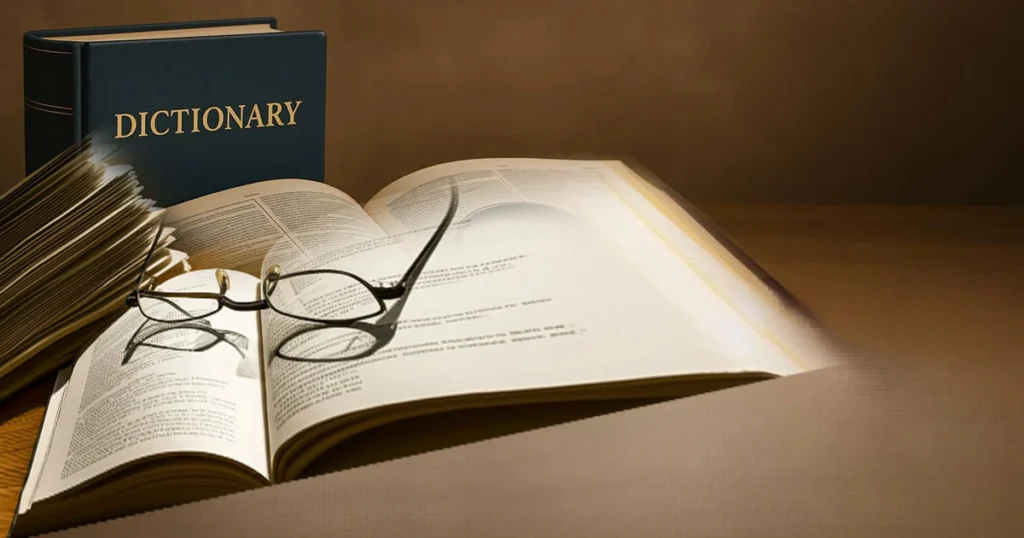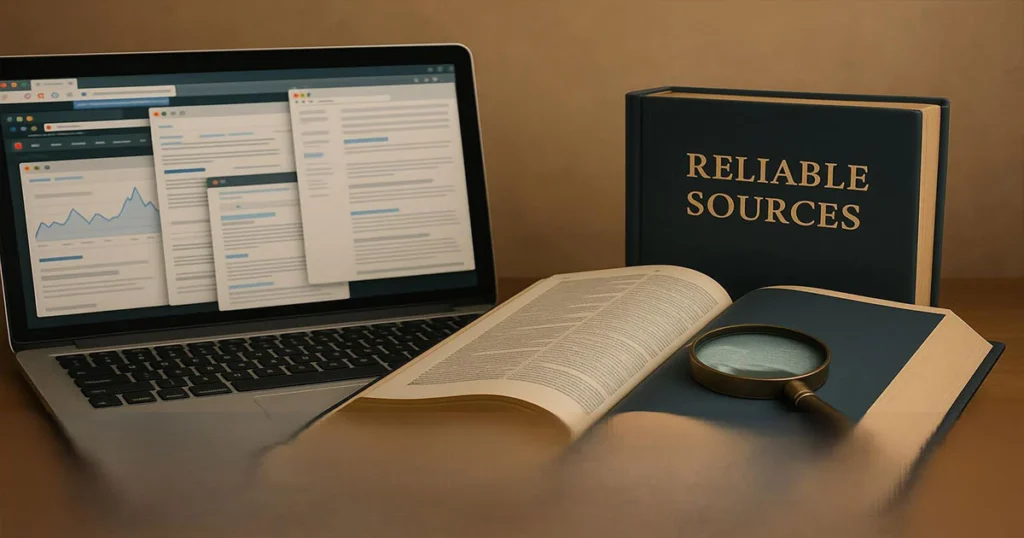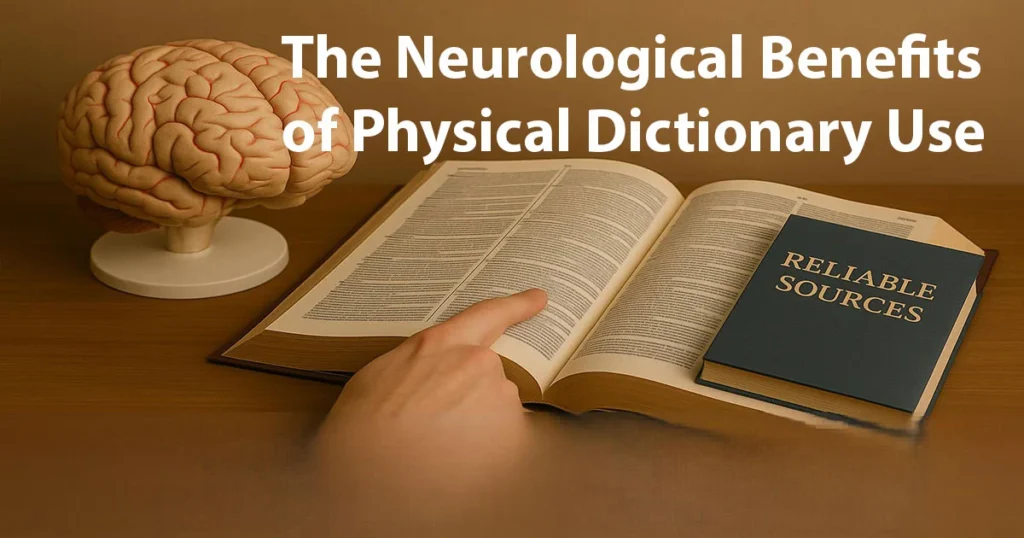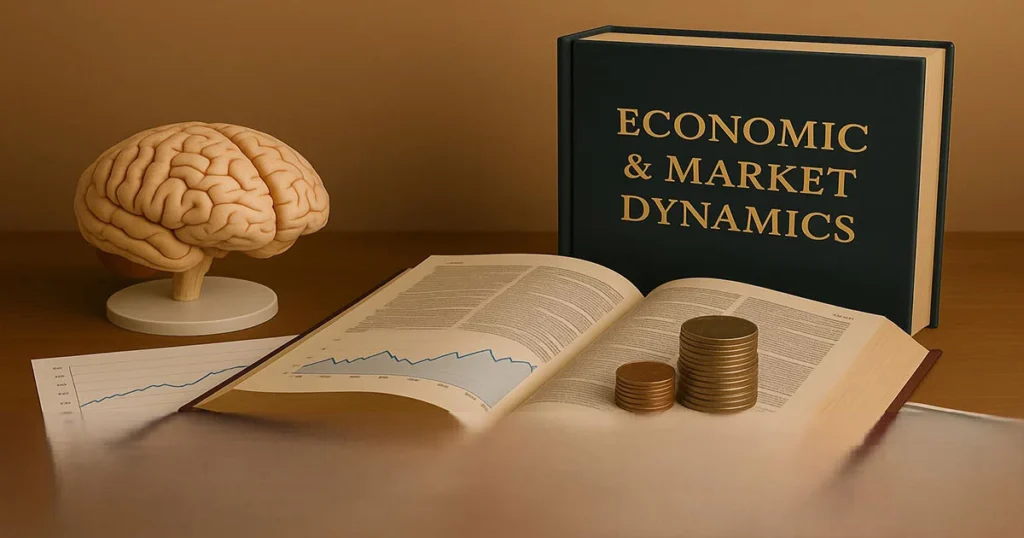Old-school dictionaries aren’t going anywhere, even with AI everywhere. They give us rock-solid definitions that actual humans have checked and double-checked, plus they capture the real story behind our words that computers just can’t get right.
Introduction
Picture this: you walk into any college library today and see something weird. Students are ignoring those thick dictionary books on the shelves, frantically typing word searches into their phones instead. Seems normal, right?
Well, here’s what they all don’t want to talk about. Those “obsolete” dictionaries are very much back, and it’s not just all about nostalgia.
Of course, ChatGPT can define any word in just three seconds. Google Translate promises that it will remove language barriers in the snap of a finger. However, there is something special that we lose with the use of digital shortcuts only. What professional dictionary makers refer to as lexicography is more than a listing of dictionary manufacturers in London, as they come to be called. It is the whole thing about the maintenance of the way we speak, the retention of the history of language, and the maintenance of definitions applied.
Here’s why those dusty old books still beat the algorithms, and why smart people are going back to them more than you’d think.
The Timeless Authority of Traditional Lexicography
The Human Touch in Word Curation
Real dictionaries belong to real people spending all their career God knows how they study language. We are dealing with people who read thousands of books, consider how words are used in this or that context, and talk over such little details of meaning.

Just imagine it that way: when you open a traditional dictionary and look up the definition of a word, you are getting the compilation that has been made by an expert with hundreds of years of life experience. They did not even surf the internet and vomit an average. They studied literature, checked historical documents, and consulted with other language experts.
This matters more than you might realize. When AI tools define words, they’re taking guesses based on whatever text they’ve been fed. Sometimes that works fine. Other times, you get definitions that sound smart but miss the point completely.
Take slang words or sensitive terms. Human editors know when a word can be offensive in some situations or that it has different meanings to various communities. They can narrate such intricacies in a manner that can enable individuals to speak respectfully and correctly.
Editorial Standards That AI Cannot Match
Professional dictionary companies don’t just throw definitions together. They are guided by the strict rules that have been developed throughout decades of publication. All attempts are made so that each and every entry is checked, rechecked, and proofread by a variety of professionals before it is able to reach print.
AI systems work differently. They analyze huge texts and attempt to discover patterns. But they don’t have editorial standards the way humans do. They might give you different definitions for the same word depending on what data they were trained on.
Here’s a real example: try asking different AI tools to define a controversial term. You’ll probably get different answers because each system learned from different sources. Traditional dictionaries avoid this problem by having human editors who make consistent decisions about how to handle tricky words.
Dictionaries that are real go through several fact checks during the checking. Editors compare sources, interview professionals, and ensure that everything is done according to the norms of their publications. This develops reference materials that can be trusted by lawyers, doctors, and teachers.
Digital Overload and the Return to Reliable Sources
Information Chaos in the AI Age
Let’s be honest about something: the internet is a mess when it comes to reliable information. Search for any word definition and you’ll get millions of results. Some are accurate, some are outdated, and some are just plain wrong.

AI chatbots make this worse by giving confident-sounding answers that might be completely made up. Tech people call this “hallucination” – when AI systems confidently present false information as fact. It occurs more than most people think.
This creates a weird situation. We have more information available than any generation in history, but finding trustworthy sources is harder than ever. Traditional dictionaries cut through all this noise by giving you one solid, reliable answer.
When dictionary publishers put their name on a definition, they’re staking their reputation on it. AI systems don’t have reputations to protect in the same way.
The Credibility Crisis Solution
Smart professionals are catching on to this problem. Attorneys adopt certain versions of dictionaries when it comes to legal matters since judges are well aware of their validity. Medical practitioners depend on special dictionaries to get the correct words that may save lives.
Such life and death scenarios can ill afford to employ definitions that may prove to be erroneous. When someone’s health or legal rights are on the line, you need sources that have been thoroughly vetted by human experts.
Educational institutions are also coming to their senses over the issue. When there is way too much unreliable information on the internet, it is important to teach students how to locate reliable sources. A proper illustration of what the authoritative sources appear like is well exemplified by the traditional dictionaries.
Cultural Preservation Through Traditional Lexicography
Language Evolution Documentation
Here’s something cool about old dictionaries: they’re like time machines for language. They show us exactly how words changed meaning over the years, which terms disappeared, and what new expressions caught on.
You can trace entire cultural movements through dictionary entries. Words that were common fifty years ago might seem completely foreign now. Other words have completely flipped their meanings. All this change is recorded in the traditional dictionaries in a way that can never be rivaled by an AI system.
Artificial intelligence is efficient in interpreting the trends of language in the present, but falls short in relation to a historical context. It simply does not understand the connection between the word of the 1920s and its usage in the 20th century, or even what phrases have a certain cultural significance that surpasses their direct translation.
Preserving Linguistic Heritage
Every region has unique ways of speaking that don’t always make it into mainstream digital communication. Local expressions, professional jargon, and traditional phrases often get lost as we all start using the same apps and websites.
Traditional dictionaries actively work to preserve these linguistic treasures. Specialized dictionaries focus on everything from sailing terminology to indigenous languages. These publications ensure that specialized knowledge doesn’t just vanish.
This preservation effort becomes of particular importance to languages and cultures that are underrepresented in AI training data. When the largely majoritarian sources of the text to build the AI systems are related to mainstream English, other language heritages are disregarded.
The Neurological Benefits of Physical Dictionary Use
Cognitive Processing Differences
Our brains have something interesting discovered about them in terms of how they are working under conditions of using a physical book as compared to a digital screen. Your nerve cells react to the process of rummaging through an actual dictionary entirely differently than what happens when you look through definitions on your phone by scrolling.

These three things give more durable memories because of turning the page, the ability to see onto which area of the page the words were actually placed, and the ability to touch the book. In some situations, students, when engaged in using the physical dictionary, tend to remember vocabulary better than those who are just working with digital tools.
Something too is good about the slow pace of the dictionary use. You are forced to consider the process of information finding instead of getting immediate responses. This strategic style will promote thinking and memory.
Enhanced Learning Through Serendipity
One of the best things about physical dictionaries is accidental discovery. As you are spotting one word, you can not help but see other words around it. This results in unplanned vocabulary growth, which cannot be accomplished by specific digital queries.
This type of viewing provides an association with a concept. You may find word families, comprehend etymology patterns, or just learn the terms that you did not even realise you needed. It is between intense searching and learning in a discovery way.
Research has indicated that those students who have a habit of using physical dictionaries on a regular basis have a larger vocabulary and capacity to think critically than those students who perform designated digital searches.
Professional Applications Where Old-School Dictionaries Excel
Legal and Academic Precision
Attorneys require word definitions that are as accurate as possible, particularly when interpreting a contract or law. Various dictionary versions are also cited by the courts because those versions can be used to give official meaning during legal suits. You cannot support a legal case based on a definition of AI, which may vary the following day.
Similar situations happen with academic researchers. Citations are effective when you are creating a peer-reviewed paper that other scholars will appreciate. Conventional dictionary sources are weighted, and AI-generated definitions are yet to be so weighty.
This is an everyday problem for professional translators. They usually refer to a variety of physical dictionaries in order to catch slight semantic peculiarities that are not detected by automated means. This careful approach ensures accurate communication across language barriers.
Specialized Professional Domains
Medical dictionaries give precise words that are required by the healers. Uniform definitions are also good since they ensure that physicians donate effectively by communicating with one another and recording details about patients. Wrong usage of medical terms can be grave.
Technical, scientists, and engineers use specialized dictionaries, which feature pronunciation information, usage, and industry context. These facts are crucial when there is a necessity for accurate communication because of safety or accuracy.
The publishing houses and the news agencies have style guides, which are based on the standardized dictionaries. This provides uniformity in them, and this keeps their content credible.
Economic and Market Dynamics
The Resilient Dictionary Industry
The books on dictionaries survived even after the forecasts that digital media would kill them off. Sales of premium dictionaries are still doing well in the sphere of professional and educational usage since the worthiness of use is more important than rapidness.

A large number of dictionary publishers have completed their subscription-based digital versions to create a blend of authoritative content and contemporary convenience. This mix method maintains the quality of editorial processes but tackles the advantages of technology.
Professional specialized dictionaries are sold at a higher price since they possess professional expertise that AI-based resources are unavailable. Medical, legal, and technical dictionaries maintain strong market positions due to their specialized authority.
Educational Market Demand
Research techniques. The importance of teaching traditional research skills in addition to digital literacy is increasingly understood by schools. Dictionary skills remain part of language education programs worldwide because they teach fundamental information evaluation abilities.
Standardized tests often require knowledge of proper dictionary usage, creating ongoing demand in academic markets. Those who are students preparing for college entrance exams should know the traditional reference skills.
International students especially appreciate that comprehensive dictionaries that set more context and examples of usage in addition to simple translation are very important to them. These tools promote teaching of language skills, far more effectively than can on-the-fly digital extractions.
Technology Integration Without Replacement
Hybrid Research Approaches
Intelligent researchers and professionals today utilize not only traditional dictionaries but also AI tools, applying the advantages of each tool. This allows reliability and speed.
Many professional environments require verification of AI-generated content against authoritative sources. Traditional dictionaries provide this verification benchmark for accuracy checking.
The intersections of digital information with traditional sources produce stronger research results. This redundant approach reduces errors and improves overall information quality.
Complementary Tool Philosophy
Not having viewed dictionaries and AI as rival technologies, visionary individuals view them as complementary tools of varying capabilities and functionality.
AI is good at quick searches and working with copious amounts of text. Conventional dictionaries’ power, cultural background, and editorial credibility. Combined, they produce overall research capabilities.
This middle-of-the-road thinking develops the skills of critical thinking, which is vital in our information-rich society. Individuals are taught to consider the source quality, cross-reference information, and make wise judgment calls concerning information reliability.
Global Perspectives on Dictionary Relevance
International Educational Standards
Certain nations will have different associations with the traditional dictionaries, dependent on the philosophy of education and values of their cultures. Nations that emphasize classical education often integrate dictionary skills into core learning standards.

International language certification programs frequently require familiarity with standard dictionary formats and usage conventions. These requirements ensure global consistency in language competency standards.
Developing nations particularly value traditional dictionaries as stable educational resources that don’t require internet access or expensive technology infrastructure. This accessibility factor makes physical dictionaries crucial for educational equity worldwide.
Cultural Authority Perspectives
The roles attributed to written and electronic sources of information are not equal across cultures. The cultural value of traditional dictionaries is sometimes much heavier in communities where the culture of academic tradition and institutional knowledge is established.
In numerous states, government agencies and the courts require specific editions of dictionaries to be used, often in an official capacity. This institutional endorsement also supports the continued validity of the relevance of traditional lexicography in the institutional fields.
International business and communication depend greatly on the standardization of dictionaries to promote proper communication between language systems and cultures.
Future Sustainability of Traditional Dictionaries
Evolving Roles in the Digital Landscape
The traditional dictionaries are not dying out – they are something that will make their place in our digitalized world. They are becoming more and more as reference sources of quality and authoritative sources than as reference sources of primary search sources.
The emergence of misinformation and AIs causing errors is a new avenue to bulk up trustworthy, human-verified sources of content. Compiled in a more traditional form, dictionaries establish themselves as the stable points of reference in the world of unreliable information.
The publishing to which it is applied is focused not on markets with low ability to pay but on special markets where authority and accuracy have higher appreciation than speed or convenience. This placement guarantees business sustainability in the long term.
Innovation Within Tradition
Publications of modern dictionaries are friendly in terms of the use of technology, but not when it comes to writing. Improved digital forms provide multimedia elements and interactivity, and maintain human editing and management.
AI assistance to conventional dictionary labor consists of helping to establish tendencies in languages and monitoring their usage. AI is made into a vehicle that supplements, not substitutes, the judgment of editorial humans.
New forms of collaboration take place with traditional publishers forming a partnership with technology providers. Such alliances merge authoritative content with experimental delivery channels, and not only do they retain expertise, but also they explore helpful new developments.
Conclusion
The actual answer does not consist of whether or not the old-school dictionaries will be able to sustain the world we live in, controlled by AI. It is about appreciating the roles they have still been playing that artificial intelligence still has not been able to perform.
Conventional dictionaries can provide what the hyperconnected world is in sore need of: trusted, meticulously edited, culturally anchored resources in language that can be used to offer anchoring in a world of information mayhem and perpetual change.
In our blind and headlong plunge into an unknown digital future, it is these guarded stores of wisdom about the human language that give us the grounding and worthiness that algorithms will never be able to match. They teach us that the language is not merely a set of data points; it is the culture, the academic tradition, and the link between people that is preserved and transferred across generations.
You will have a different action to take next time you see an unknown word. Take your phone and a real dictionary with you. You might be surprised to discover that the slower, more deliberate process of traditional lookup offers insights and connections that rapid digital searching simply cannot provide.
Have you used both traditional dictionaries and digital tools? What were you differences? Write about your ideas and experiences, we will be delighted to note your experience with language learning and research techniques.
FAQ
Are Physical dictionaries published nowadays?
- Absolutely. Dictionaries are being printed by huge publishers like Merriam-Webster, Oxford, and Cambridge, and their online versions. Scholarly, professional, and specialist markets continue to require authoritative print sources with the type of credibility and reliability that electronic sources can only supply in some cases.
How can traditional dictionaries compete with instant AI translations and definitions?
- They compete by offering something different – authority, accuracy, and cultural context rather than just speed. They provide human oversight, word history, and scholarly reliability that AI systems can’t guarantee. Professional environments often need this level of credibility for legal, medical, or academic work where accuracy matters more than convenience.
Why do schools still bother teaching dictionary skills when students have smartphones?
- Dictionary skills teach way more than just looking up words. They learn to use critical thinking, research methods, and evaluate the trustworthiness of the information consumed, all of which are important in terms of the hyper-information era. Learners are taught to identify credible resources, learn the dynamics of language evolution, and have the patience to conduct an intense research rather than settle content with a prompt reply.
Do traditional dictionaries keep their content as current as AI systems do?
- Traditional dictionaries update less frequently but much more carefully. New editions incorporate thoroughly researched new words and meanings through serious editorial processes. This deliberate pace ensures accuracy and prevents the inclusion of temporary slang or incorrect definitions that might show up in rapidly updated AI systems.
Will traditional dictionaries eventually become completely obsolete as AI gets better?
- Traditional dictionaries will probably evolve rather than disappear entirely. They are becoming more and more quality standards and professional references. As AI systems grow more complex, the importance of valid sources of verification grows as well, and that is why, regardless of the fact that the world of information is going digital, traditional dictionaries are becoming vital trust marks in our digital information universe.

